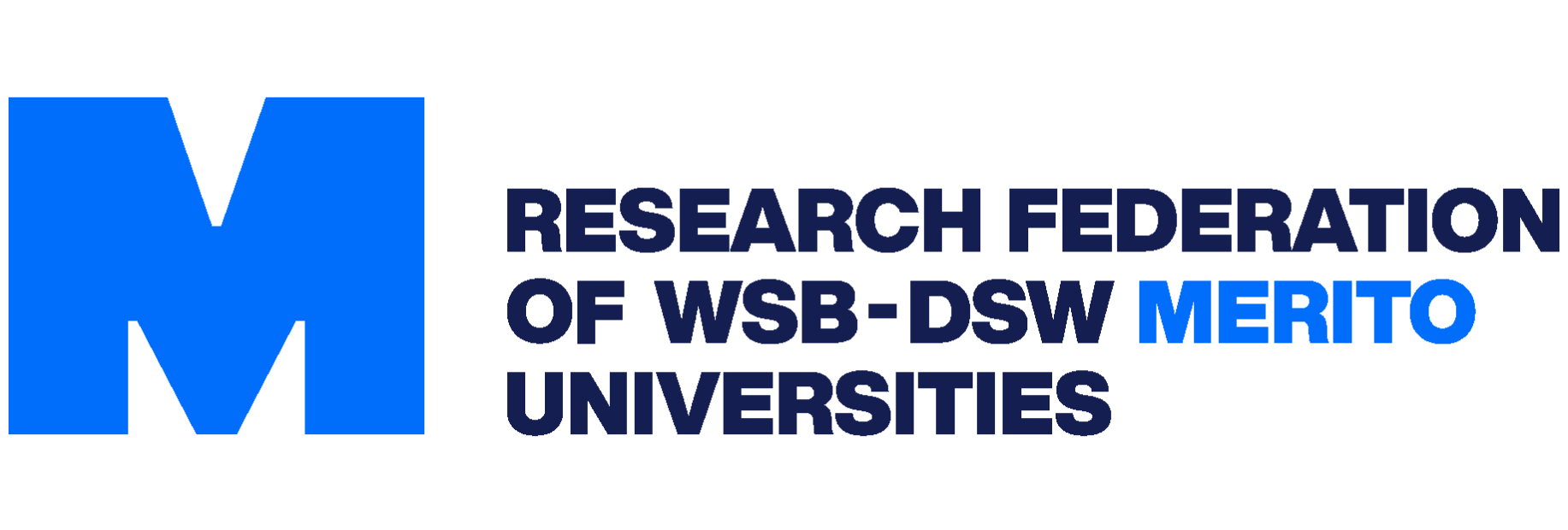
Mission and Tasks
The research centres within the Research Federation of WSB & DSW Merito Universities bring together scholars from member institutions and international partners to conduct interdisciplinary and long-term research. Each centre focuses on an original scientific theme, strengthening the Federation’s academic profile and international recognition. Through their activities, the centres foster innovation, collaboration, and the practical impact of research.
Research Centre of System Risk Managament
Johannes Platje, Assoc. Prof., WSBU Merito Professor
leads the Center, which specializes in a unique approach to identifying and analyzing systemic risk. Unlike other research centers in Poland, its holistic methodology does not focus solely on specific events but also examines fundamental factors that shape the perception and neglect of systemic risk, such as cognitive biases and worldviews.
The Center develops empirical models and tools for risk identification and management, enabling the creation of innovative preventive strategies and early warning systems. Its key research areas include:
- Establishing international focus groups and applying the Delphi technique.
- Identifying systemic risk determinants in the context of sustainable development.
- Developing risk assessment and management tools, including surveys and biometric studies.
- Analyzing the relationship between systemic risks, cognitive biases, and worldviews.
- Creating interactive educational tasks and surveys to assess risk perception.
Main Objective:
The Center's primary goal is to develop an online application that will assess knowledge and perceptions of the Sustainable Development Goals (SDGs), as well as the impact of cognitive biases and worldviews on systemic risk perception.
Through its comprehensive approach, the Center introduces a new standard in systemic risk management research, contributing to both Polish and global advancements in the field.
Contact: [email protected]
Center for Migration, Integration, and Humanitarian Aid Research
Michał Nowosielski, Assoc. Prof., WSBU Merito Professor
leads the Center, which adopts an interdisciplinary approach to migration research, particularly in areas less explored in Poland, such as security, humanitarian aid, public administration, and economic issues. The Center collaborates with a wide range of stakeholders, including public administration, NGOs, and businesses, supporting both scientific development and the practical application of migration-related knowledge.
Key Research Areas:
- Influx of Refugees from Ukraine After 2022 The Center conducts a multidimensional analysis of responses to forced migration from Ukraine, considering security issues, educational challenges, housing, humanitarian logistics, and governance at different levels. This project, funded by the Polish-German Science Foundation, is carried out in cooperation with partners from Germany.
- Situation of the Ukrainian Community in Poland The Center examines the adaptation process of Ukrainians in Poland, their perceptions of their living conditions, challenges, and future plans, with a special focus on their integration into Polish society. In collaboration with the Stand With Ukraine Foundation, studies on their needs and future aspirations are planned.
- Public Policies Related to Migration The Center monitors and analyzes the development of new migration and integration policies at both national and local levels. It also engages in advisory activities, supporting local governments in migration management and integration strategy development.
- Cultural Security of Polish Emigrants Research focuses on the role of culture in migration processes, considering perspectives from the country of origin, host country, and migrants themselves. The Center analyzes how migrants create transnational cultural practices.
Regular Activities:
The Center organizes recurring scientific seminars, showcasing the research approaches and findings of its team members. Research projects employ innovative methodologies, incorporating perspectives from states, host communities, and migrants.
The Center for Migration Research serves as a crucial reference point for both scientific and practical migration-related activities in Poland, offering a unique perspective on migration in the context of contemporary global and local challenges.
Contact: [email protected]
Center for Family Business
Anna Motylska-Kuźma, PhD
leads Poland's first research center dedicated to family business studies. The Center's uniqueness lies in its multidisciplinary team, bringing together experts in management, economics, sociology, law, history, and psychology, as well as its close cooperation with family enterprises. It serves as a key knowledge hub on family businesses in Poland, conducting research, supporting education and advisory activities, and shaping discussions on the challenges faced by this sector.
Scientific and Research Activities:
- Implementation of the NCN-Beethoven project: "Family Business Models: The Family as a Strategic Resource", involving comparative studies between Poland and Germany.
- Creation of a research panel to analyze the opinions of family business entrepreneurs from various industries.
- Ongoing monitoring of the family business sector in Poland, in collaboration with around 200 family enterprises, with annual reports published.
- Development of the Family Business Lexicon in Polish and English, along with the publication of research articles in international journals.
Educational and Training Activities:
- Development of teaching materials, including textbooks for courses such as "Family Business Management" and "Succession in Family Enterprises".
- Organization of a national competition for the best master’s and doctoral theses on family entrepreneurship.
- Meetings between family business entrepreneurs and students, as well as promoting knowledge about family businesses through various events.
Advisory Activities:
- Supporting family businesses, particularly in succession processes, through consulting, peer learning, and networking events such as the Family Business Academy.
The Center aims to enhance research, educational, and advisory competencies in the field of family entrepreneurship, providing knowledge and support to both the academic community and business practitioners.
Contact: [email protected]
